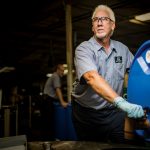
Tom Forsythe, Executive VP
KYZEN Corporation
Nashville, TN, USA
Quality is personal. Each of us has a personal definition for the meaning of quality. After all regardless of our profession, every day we encounter food, services, goods and people all of whom we hope are of good quality. Of course, we in the business of making things often have a more focused definition. Does this good or service meet the needs and expectations of a customer who will be willing to pay for it?
Fun Fact:
Cicero coined the Latin word qualitas, which is where the modern word quality comes from.
30 or so years ago when our company KYZEN was founded, one of the goals was to be a “quality shop.” I don’t think KYZEN was unique in choosing that as one of its goals, some others being survival as well as being a fun place to work were on that list as well. As we went about defining and meeting that “quality shop” standard, we encountered many opportunities and challenges. At first, our thoughts focused on the challenges: quality testing, manufacturing procedures, safety of our supply chain and product development focused on creating products that meet the needs and expectations of our customers
This strikes me as the norm for most companies pursuing a quality reputation, especially in their early days. The challenge of course is defining the standards of performance and behavior that will be accepted as quality by the marketplace. Once you define quality, how does a company embrace that quality standard? How high should one set the bar for quality: is “good enough” acceptable, or should one aspire for something more?
It is easy to write concepts and goals down on paper. At least it is easier to write them down than to follow through with the actions required for a commitment to quality. What happens when achieving that aspirational standard has a cost, or even more telling what happens when a product or service is OK but, in all honesty not quite good enough. What choice gets made? Ship it or try again? Go to market now, or go back to the lab bench and continue inventing? It is often said quality is about getting the little things right. Colin Powell, a former Secretary of State and Army General here in America said it more eloquently:
“If you are going to achieve excellence in big things, you develop the habit in little matters. Excellence is not an exception; it is a prevailing attitude.”
-Colin Powell
No wonder General Powell has been so successful. Excellence is a prevailing attitude, and most certainly excellence embodies the concept of quality ~ exceptional quality. Looking back over our now 30 plus years in business, I can clearly see where a handful of decisions long ago created the prevailing attitude that set KYZEN on its never-ending journey seeking excellence focused on the convergence of science and care.
One event stands out clearly in my mind as both validating our core self-image, id for the psychology majors in the audience, and for helping us realize that the journey to excellence is not a solitary one but rather the wisdom, effort and care of many, both inside and outside your organization that helps you persevere on the quest.
Back in the 90s, the early 90s, the forward-thinking companies could see the writing on the wall about chlorofluorocarbons (CFCs) and their imminent demise. They had been used for many things due to their high safety ratings for we the human species. However, we learned that while safe for humans, they were not so good for the ozone layer, which was itself pretty important for humans never mind the rest of the flora and fauna of planet earth. So, the world changed how it did many things, and one of those things was how we accomplished cleaning processes in the industrial, non-consumer part of the global economy.

One of those forward-looking companies was in the rocket business. I am not talking about bottle rockets you might set off on a holiday for fireworks. I am talking about rockets that launched astronauts, satellites, and whatever else was needed into space. When your customer is NASA and your business is making rockets for space, I think we can all agree that safety is a prevailing attitude of the highest magnitude. Safety only happens when you get in the habit of addressing all the little things so the big things can accomplish the goal. This is a key part of life as a rocket scientist.
Everyone has heard a comment or two about how rocket scientists are pretty smart people. I can personally attest that the stereotype is true. Everyone we have ever met that has had anything to do with the space program is among the smartest people we had ever encountered. As smart people, they were very worried about how they would clean the various pieces of their rockets when the CFCs were gone. When rocket scientists get worried, they go into action. They learn. They review. They scrutinize and of course, they test. They leave no stone unturned. No “unlikely scenario” is too far-fetched to be explored and understood. They take no chances that can possible be avoided.
So, when we got a phone call, yes phone call since there was not much e-mail back then, saying they wanted to learn more about a particular KYZEN product, we were surprised. We were still a rather new company and thought the rocket people would not want to work with a new company. We were wrong. The rocket scientists want to learn more about our product because they thought it could play a unique role in their manufacturing operation, a role that they had found very few products could accomplish.
What followed was life changing for most of us at KYZEN. We had meetings and conference calls, lots of samples and lab testing as the rocket scientists tested every small thing that they thought needed to be explored. They continued to like what they saw in the data. Every result seemed to
lead to another test or new laboratory protocol we needed to learn. It was intoxicatingly fun. You see rocket scientists are not only smart people, they are nice people who are fun to work with and be around. We absolutely loved being involved in the project.
This of course took quite a long time to work through, and as a small company it took a significant use of our resources to keep up with them. Along the way, we had to decide if “the view was worth the climb.” Would this potential customer ever need enough of our product to justify the investment we were making to help them qualify our product? We chose to look at it from two perspectives.
- Good business? The good news is rockets are very large, and a great deal of effort goes into making them. The only problem is unlike cars, they don’t really make all that many rockets. After much consideration, we decided if we could be qualified to clean some important pieces of the process, our guess was we would be happy with the size of the business.
- Good Company? While we were never sure if our parents knew their admonitions to always be in the company of good people were inspired by the Roman philosopher Epictetus, we decided that having a bunch of rocket scientists as customers would challenge and improve us as a company.
“The key is to keep company only with people who uplift you, whose presence calls forth your best.”
– Epictetus
We decided we were all in on the project. Then came the day we had to walk our talk about being a quality producer of products for the most demanding of customers.
It came time for the “site visit and inspection”. We hosted a team of inspectors, 5 or 6 as I recall ~ it seems rocket scientists always travel in packs. They inspected our documentation. They observed our manufacturing process in action. They observed our quality sampling and testing procedures. They reviewed anything and everything they wanted to see. We chose to be a 100% open book, and they reviewed all 100%.
At the end of that several day visit, it came time to hear the results and learn whether we would be their supplier of choice. We were nervous and more than a little proud when they announced we passed and would win the business. We were beyond happy, and they were happy for us. Then something unexpected happened.
They said, yes, you guys have passed and are acceptable. However, “we have some recommendations for you that will help you reach the next level”, to be truly exceptional. They wanted to share those recommendation with us because they thought we had the talent and capability to reach that next level. They did not want an answer that day but asked us to think about it as they congratulated us and traveled back home.
This was the moment when KYZEN had a choice to make. We had good enough quality for the space program. Were we content with that, or did we aspire to something more? Could we genuinely embrace a prevailing attitude about quality (and our customers) that would perhaps, maybe enable us to become a truly exceptional company. Were we up to that challenge, or at least willing to try?
“You need to let the little things that would ordinarily bore you suddenly thrill you.”
― Andy Warhol
The reason I remember that day so clearly all these years later, is because we chose to accept the challenge. We decided that we had a lot to learn from the best in the world, and they were eager to be our teachers. What ensued was a decades long partnership that focused on quality and being a reliable supplier that could always be counted on to worry about the small things, and to be excited about those small things because solving the small challenges prevented the bigger ones from happening. We became a better company that day, and the methods and procedures we learned and embraced have allowed KYZEN to build a global company with manufacturing on three continents and customers in 50 or so countries.
What we learned from our rocket scientist friends has allowed up to be a company of life learners, adapting to the changes in our markets, countries of operations and the global economy. We continue to embrace change and opportunity, and always thank our old friends for encouraging us to focus on details and to do the hard work on the small stuff that makes all the large things possible.